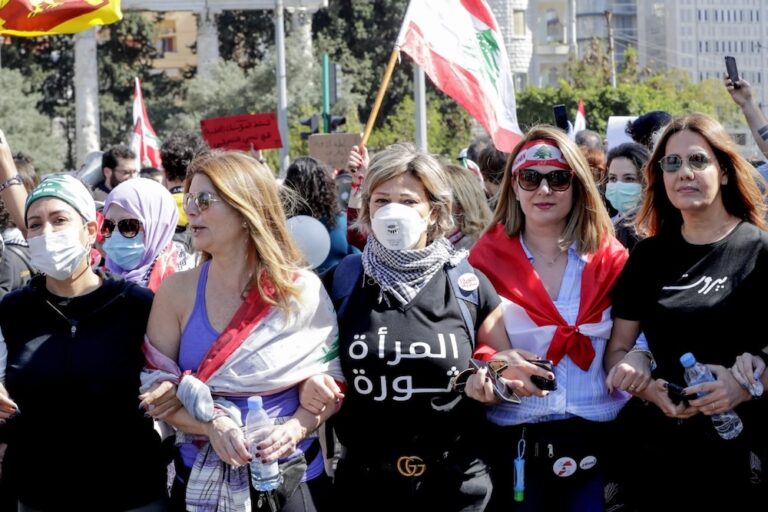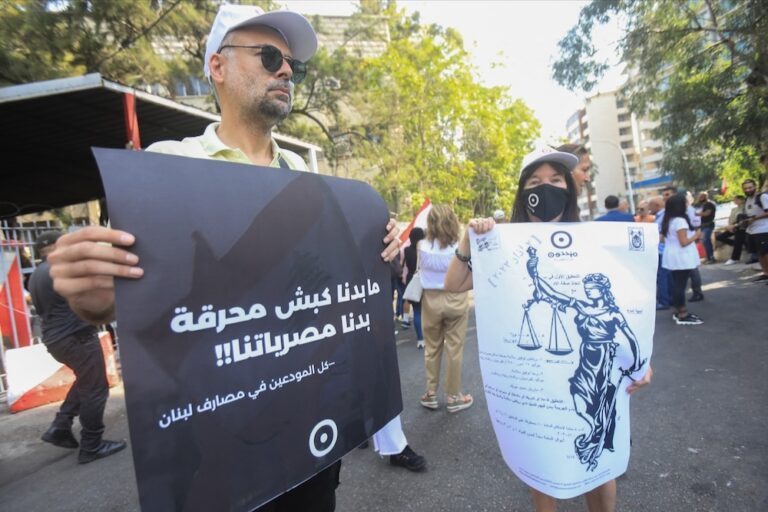(HRW/IFEX) – The following is a Human Rights Watch press release: **Updates IFEX alert of 12 October 1999** TRIAL OF FAMOUS LEBANESE SINGER TO BEGIN Marcel Khalifa Faces Three Years in Prison (New York, November 2, 1999) — The criminal prosecution of the internationally known Lebanese singer and composer Marcel Khalifa is a blatant violation […]
(HRW/IFEX) – The following is a Human Rights Watch press release:
**Updates IFEX alert of 12 October 1999**
TRIAL OF FAMOUS LEBANESE SINGER TO BEGIN
Marcel Khalifa Faces Three Years in Prison
(New York, November 2, 1999) — The criminal prosecution of the
internationally known Lebanese singer and composer Marcel Khalifa is a
blatant violation of his right to freedom of expression, Human Rights Watch
said today. The trial is scheduled to start in Beirut on November 3, before
judge Ghada Abu Karroum. Khalifa is accused of “insulting religious values”
by including a two-line verse from a chapter of the Koran in his song “I am
Yousef, O Father.” He faces imprisonment of up to three years if found
guilty.
“We hope that the judge will use international human rights law as one basis
for rejecting the charges against Marcel Khalifa,” said Hanny Megally,
executive director of the Middle East and North Africa division of Human
Rights Watch. “This case is a direct legal challenge to the right to freedom
of expression in Lebanon. The court has the opportunity to establish an
important legal precedent by issuing a verdict in Khalifa’s favor.”
On October 2, the newly appointed investigating judge, Abdel Rahman Shihab,
recommended that prosecutors bring criminal charges against Khalifa for
“insulting religious values by using a verse from the chapter of Joseph from
the Holy Koran in a song.” On October 3, senior Sunni Muslim clerics in
Lebanon ruled that singing verses from the Koran was “absolutely banned and
not accepted.” Under article 473 of Lebanon’s penal code, blasphemy in
public is punishable by one month to one year in prison. Article 474 of the
penal code authorizes imprisonment of six months to three years for publicly
insulting a religion.
Khalifa, who is a Christian, recorded a song in his 1995 album “The Arabic
Coffee Pot” that was based on a 1992 poem of the prominent Palestinian poet,
Mahmoud Darwish. The poem adapted this verse from the story of Yousef
(Joseph) in the Koran: “O my father, I saw eleven stars and the sun and the
moon bowing before me in homage.”
The highest Sunni Muslim religious authority in Lebanon, Grand Mufti Sheikh
Muhamed Rashid Qabbani, has maintained repeatedly that Khalifa is guilty of
blasphemy for singing a verse from the Koran. Sheikh Qabbani said on October
21: “There is a limit to freedom of expression. One limit is that it should
not infringe on people’s religious beliefs.” Mahmoud Darwish, whose poem
Khalifa set to music, criticized the legal proceedings in an interview with
the Lebanese daily newspaper al-Diyar on October 10. “Fundamentalism is in
the process of stifling culture and creation in the Arab world,” he said. “I
say it is shameful. I am ashamed. We should all be ashamed. If Marcel
Khalifa is found guilty, it will be an insult to culture.”
Human Rights Watch said today that Khalifa’s recordings and performances are
protected under the International Covenant on Civil and Political Rights
(ICCPR), a treaty to which Lebanon is a state party. Article 19 of the ICCPR
grants to everyone the right to freedom of expression. It further states
that “this right shall include freedom to seek, receive and impart
information and ideas of all kinds, regardless of frontiers, either orally,
in writing or in print, in the form of art, or through any other media of
his choice.” As a state party to the ICCPR, Lebanon is obligated to respect
and ensure that all individuals in its territory and subject to its
jurisdiction enjoy the right to freedom of expression.
The criminal prosecution of the famous performer has caused an uproar among
intellectuals and lawyers in Lebanon. At meetings and rallies they have
vigorously supported Khalifa’s right to freedom of expression.


